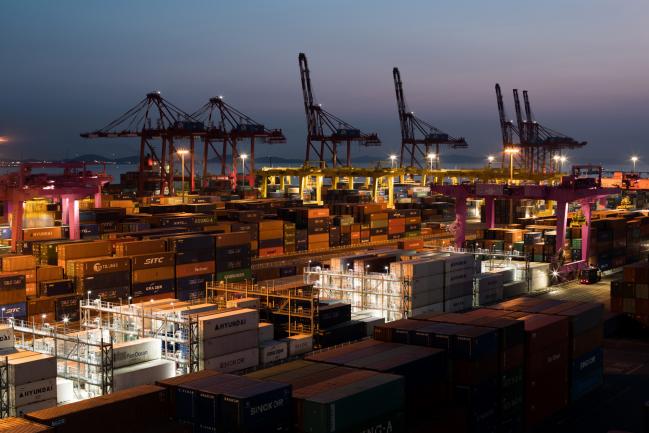(Bloomberg) -- Donald and his South Korean counterpart Moon Jae-in signed a renegotiated free-trade agreement on the sidelines of the United Nations General Assembly, marking the first time the U.S. president has finalized a major trade deal since entering office.
The deal is “tangible evidence of the strength of the relationship between our two countries,” the leaders said in a joint statement Monday in New York.
The signing ceremony represents key progress for proponents of free trade between the partners, as Trump last year reportedly planned to withdraw from the pact, which came into effect in 2012. Trump during his election campaign called the original agreement a “jobs killer” and complained its terms had contributed to America’s growing trade deficit.
As part of his push to rebalance global trade in America’s favor, the president is also negotiating changes to the North American Free Trade Agreement and is pressuring China to lower its barriers to American products. Nafta negotiations are ongoing, while there are few signs of progress with Beijing.
Trade analysts say changes to the South Korea agreement were largely cosmetic, as the president limited the scope of renegotiations by declining to invoke U.S. trade law that would have required congressional approval of the final deal. Terms of the new pact, which the White House unveiled in March, showed modifications to tariffs and automotive quotas.
Trump on Monday characterized the FTA with South Korea as “a brand new agreement” rather than an incremental change. Moon, speaking through a translator, said the two countries had made “improvements and modifications” to the deal.
“We are now going to start sending products to South Korea,” Trump said. “These outcomes give the finest American-made automobiles, innovative medicines and agricultural crops much better access to Korean markets.”
Under the new deal, South Korea will double to 50,000 the number of cars each U.S. automaker can sell in the Asian nation without meeting local safety standards. But no American company sells much more than 10,000 cars a year in South Korea.
South Korea did agree to terms that allowed the U.S. to keep its 25 percent import tariff on trucks in place until 2041 rather than 2021 as originally planned. The deal also placed a quota on South Korean steel shipments to the U.S.
South Korean lawmakers, who must sign off on the deal, have warned they won’t approve it if the U.S. imposes tariffs on Korean cars as part of Trump’s threat to protect domestic automakers from global imports. The Trump administration since May has been studying whether auto imports threaten national security and warrant tariffs or quotas. Korean officials have been pushing for an assurance that they will receive an exemption.
The deal does remove a potential wrinkle in U.S.-South Korean relations, which have been tense at times since Trump took office. The U.S. president has questioned the cost of the military alliance with South Korea and repeatedly knocked the country on trade even while seeking to cooperate to eliminate North Korea’s nuclear threat.
Moon said he would deliver a private message from North Korean leader Kim Jong Un to Trump during the UN meetings in a bid to push along denuclearization talks. He aims to convince the U.S. to agree to a peace declaration with North Korea, arguing that it’s merely a political statement that won’t affect the American military presence in South Korea.
